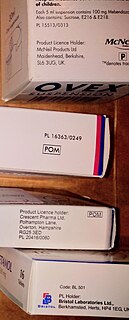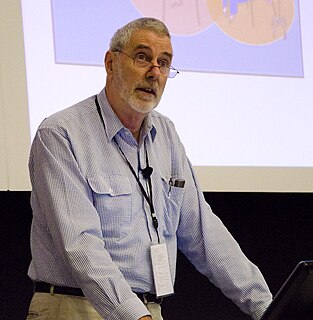Related Research Articles

A prescription drug is a pharmaceutical drug that legally requires a medical prescription to be dispensed. In contrast, over-the-counter drugs can be obtained without a prescription. The reason for this difference in substance control is the potential scope of misuse, from drug abuse to practicing medicine without a license and without sufficient education. Different jurisdictions have different definitions of what constitutes a prescription drug.
The pregnancy category of a medication is an assessment of the risk of fetal injury due to the pharmaceutical, if it is used as directed by the mother during pregnancy. It does not include any risks conferred by pharmaceutical agents or their metabolites in breast milk.
The Pharmaceutical Benefits Scheme (PBS) is a program of the Australian Government that subsidises prescription medication for Australian citizens and permanent residents, as well as international visitors covered by a reciprocal health care agreement. The PBS is separate to the Medicare Benefits Schedule, a list of health care services that can be claimed under Medicare, Australia's universal health care insurance scheme.

Dextropropoxyphene is an analgesic in the opioid category, patented in 1955 and manufactured by Eli Lilly and Company. It is an optical isomer of levopropoxyphene. It is intended to treat mild pain and also has antitussive and local anaesthetic effects. The drug has been taken off the market in Europe and the US due to concerns of fatal overdoses and heart arrhythmias. It is still available in Australia, albeit with restrictions after an application by its manufacturer to review its proposed banning. Its onset of analgesia is said to be 20–30 minutes and peak effects are seen about 1.5–2.0 hours after oral administration.

Cefuroxime, sold under the brand name Zinacef among others, is a second-generation cephalosporin antibiotic used to treat and prevent a number of bacterial infections. These include pneumonia, meningitis, otitis media, sepsis, urinary tract infections, and Lyme disease. It is used by mouth or by injection into a vein or muscle.

The regulation of therapeutic goods, defined as drugs and therapeutic devices, varies by jurisdiction. In some countries, such as the United States, they are regulated at the national level by a single agency. In other jurisdictions they are regulated at the state level, or at both state and national levels by various bodies, as in Australia.

Cannabidiol (CBD) is a phytocannabinoid discovered in 1940. It is one of 113 identified cannabinoids in cannabis plants, along with tetrahydrocannabinol (THC), and accounts for up to 40% of the plant's extract. As of 2019, clinical research on CBD included studies related to anxiety, cognition, movement disorders, and pain, but there is insufficient high-quality evidence that cannabidiol is effective for these conditions. Nevertheless, CBD is a popular herbal drug, widely promoted with claims of particular therapeutic benefits. The global market size for CBD was predicted to exceed US$47 billion by 2028.
The Australian Drug Evaluation Committee or ADEC, was a committee that provided independent scientific advice to the Australian Government regarding therapeutic drugs. The committee was originally formed in 1963 and more recently authorised under the Therapeutic Goods Act 1989 (Cth) as part of the Therapeutic Goods Administration (TGA). In 2010, ADEC was replaced by the Advisory Committee on Prescription Medicines (ACPM)
The Therapeutic Goods Administration (TGA) is the medicine and therapeutic regulatory agency of the Australian Government. As part of the Department of Health, the TGA regulates the quality, supply and advertising of medicines, pathology devices, medical devices, blood products and most other therapeutics. Any items that claim to have a therapeutic effect, are involved in the administration of medication, or are otherwise covered by the Therapeutic Goods Act 1989, the Therapeutic Goods Regulations 1990, or a ministerial order, must be approved by the TGA and registered in the Australian Register of Therapeutic Goods.
Pegfilgrastim, sold under the brand name Neulasta among others, is a PEGylated form of the recombinant human granulocyte colony-stimulating factor (GCSF) analog filgrastim. It serves to stimulate the production of white blood cells (neutrophils). Pegfilgrastim was developed by Amgen.
The Standard for the Uniform Scheduling of Medicines and Poisons (SUSMP) is an Australian legislative instrument produced by the Therapeutic Goods Administration (TGA). Before 2010, it was known as the Standard for the Uniform Scheduling of Drugs and Poisons (SUSDP). The SUSMP classifies drugs and poisons into different Schedules signifying the degree of control recommended to be exercised over their availability to the public. As of 2022, the most recent version is the Poisons Standard February 2022.
The Australia New Zealand Therapeutic Products Authority (ANZTPA) is a proposed authority which if adopted in both Australia and New Zealand will be the sole authority which regulates therapeutic goods in both countries. The authority will replace the Therapeutic Goods Administration in Australia and Medsafe in New Zealand.

Martin Paul Whitely, is a mental health researcher, author and was a Labor member of the Western Australian Legislative Assembly from February 2001 until he retired from state politics in March 2013. During his parliamentary and research career Whitely has been a prominent critic of increasing child mental health medication prescribing rates.
Because of the uncertain nature of various alternative therapies and the wide variety of claims different practitioners make, alternative medicine has been a source of vigorous debate, even over the definition of "alternative medicine". Dietary supplements, their ingredients, safety, and claims, are a continual source of controversy. In some cases, political issues, mainstream medicine and alternative medicine all collide, such as in cases where synthetic drugs are legal but the herbal sources of the same active chemical are banned.
Regulation of electronic cigarettes varies across countries and states, ranging from no regulation to banning them entirely. For instance, e-cigarettes were illegal in Japan, which forced the market to use heat-not-burn tobacco products for cigarette alternatives. Others have introduced strict restrictions and some have licensed devices as medicines such as in the UK. However, as of February 2018, there is no e-cigarette device that has been given a medical license that is commercially sold or available by prescription in the UK. As of 2015, around two thirds of major nations have regulated e-cigarettes in some way. Because of the potential relationship with tobacco laws and medical drug policies, e-cigarette legislation is being debated in many countries. The companies that make e-cigarettes have been pushing for laws that support their interests. In 2016 the US Department of Transportation banned the use of e-cigarettes on commercial flights. This regulation applies to all flights to and from the US. In 2018, the Royal College of Physicians asked that a balance is found in regulations over e-cigarettes that ensure product safety while encouraging smokers to use them instead of tobacco, as well as keep an eye on any effects contrary to the control agencies for tobacco.
The scientific community in United States and Europe are primarily concerned with the possible effect of electronic cigarette use on public health. There is concern among public health experts that e-cigarettes could renormalize smoking, weaken measures to control tobacco, and serve as a gateway for smoking among youth. The public health community is divided over whether to support e-cigarettes, because their safety and efficacy for quitting smoking is unclear. Many in the public health community acknowledge the potential for their quitting smoking and decreasing harm benefits, but there remains a concern over their long-term safety and potential for a new era of users to get addicted to nicotine and then tobacco. There is concern among tobacco control academics and advocates that prevalent universal vaping "will bring its own distinct but as yet unknown health risks in the same way tobacco smoking did, as a result of chronic exposure", among other things.

Kenneth John Harvey AM is an Australian public health doctor, currently Honorary Adjunct Associate Professor at the Institute for Evidence-Based Healthcare in Bond University. Described by The Age as an "anti-quackery crusader", Harvey is an advocate of evidence-based medicine and a critic of pharmaceutical marketing and unproven diet products. He is the president of Friends of Science in Medicine. In 2017, Harvey was awarded a Member of the Order of Australia (AM) for his "significant service to community health and the pharmaceutical industry”.

Siponimod, sold under the brand name Mayzent, is a selective sphingosine-1-phosphate receptor modulator for oral use that is used for multiple sclerosis (MS). It is intended for once-daily oral administration.

Sodium glycerophosphate, sold under the brand name Glycophos, is a medication used to supplement phosphate. It is administered via intravenous infusion.
A custom-made medical device, commonly referred to as a custom-made device (CMD) or a custom device, is a medical device designed and manufactured for the sole use of a particular patient. Examples of custom-made medical devices include auricular splints, dentures, orthodontic appliances, orthotics and prostheses.
References
- ↑ Administration, Australian Government Department of Health Therapeutic Goods. "Legislation & legislative instruments". Therapeutic Goods Administration (TGA). Retrieved 3 July 2022.
- ↑ Administration, Australian Government Department of Health Therapeutic Goods. "About the Australian therapeutic goods legislation". Therapeutic Goods Administration (TGA). Retrieved 3 July 2022.
- ↑ Administration, Australian Government Department of Health Therapeutic Goods (21 December 2020). "Notice of final decision to amend the current Poisons Standard - nicotine". Therapeutic Goods Administration (TGA). Retrieved 3 July 2022.
- ↑ Administration, Australian Government Department of Health Therapeutic Goods (27 June 2022). "Nicotine vaping products: Information for prescribers". Therapeutic Goods Administration (TGA). Retrieved 3 July 2022.